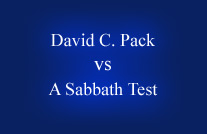

Argument XII
Creating Hurdles


In his defense of dining out on the Sabbath, David C. Pack accuses the authors of A Sabbath Test of manufacturing a "new threshold of righteousness." But just who is guilty of what this COG leader claims? Below is his accusation followed by our respons
David C. Pack:
"The Bible is explicit and straightforward about what is allowed and what is forbidden. Some attempt to attain a new threshold of “righteousness” by setting up a unique hurdle of their devising. Such is the case with this recently-contrived issue of avoiding restaurants on the Sabbath. We have seen that it was necessary for the advocates of this belief to subtly trash Mr. Armstrong, since he was “out of step” with their newly established definition of righteousness."
Our Response:
First, with respect to "trashing Mr. Armstrong," Mr. Pack can't furnish one syllable in A Sabbath Test that does any such thing. Furthermore, both of the book's authors maintain comprehensive libraries dedicated to Mr. Armstrong and his work (see HWA Library). It is interesting that Mr. Pack does not have one of Mr. Armstrong's writings posted on his website.
Secondly, with respect to his comment regarding the Bible's straightforward statements concerning what is allowed and what is forbidden on the Sabbath, we are in total agreement. This is why we are so mystified that this servant would defy God's word so brazenly. Consider what the scriptures say regarding his Sabbath dining practices.
You shall not acquire food on the Sabbath.
Exodus 16:26
God actually rebuked the Israelites when they attempted to engage in this practice. His exact words were, “How long refuse you to keep my commandments and my laws?” (Ex. 16:26-28). He uttered them after the Israelites went out to gather food (manna) on the Sabbath, in clear violation of His command. Tragically, Mr. Pack somehow believes he may hire others to gather it for him.
You shall not prepare food on the Sabbath
Exodus 16:23
God specifically instructed the Israelites to do their Sabbath meal preparation on the sixth day (Ex. 16:23). Furthermore, at no time did He suggest that they could commission others to prepare it for them on holy time. He actually indicated that the preparation day was given to “prove” the Israelites and to test their obedience (Ex. 16:4). However, Mr. Pack teaches that God only prohibited the acquisition and preparation of manna on the Sabbath—not food altogether (See: "No More Manna"). Therefore, he may now seek out unbelievers and pay them to prepare his non-manna Sabbath meals.
You shall not go outside your place on the Sabbath
Exodus 16:29
God revealed this specific aspect of His command because the Israelites went out to obtain food on the Sabbath (Ex. 16:29). Furthermore, God was furious with this practice and He made that fact abundantly clear.
At this point, it is interesting to note that the only way God’s people today can avail themselves of a restaurant on the Sabbath is to go outside “their place.” They must literally go out into the world where God’s Sabbath is being profaned and seek out the services of unbelievers and their sin. It is even referred to as "going out to eat." Despite this fact, Mr. Pack believes God somehow condones this sin in today's world.
You shall not labor on the Sabbath
Exodus 20:10
God first addressed the issue of work on the Sabbath when He made the seventh day. At that time, the Great Creator of Heaven and Earth rested from His labor (Gen. 2:2-3). Later, when giving the Ten Commandments on Mount Sinai, God made reference to this rest (Ex. 20:11).
Additionally, God knew that there were only two broad sources of labor relative to the fourth commandment—the work you perform and the work that is performed on you behalf. The fourth commandment addresses both types (Ex. 20:9-10). First, "you shall not do any work" on the Sabbath. That addresses your part. Secondly, no one who comes into your sphere of influence shall be compelled to labor on your behalf. This includes family, servants, strangers, and even livestock. That portion of the command addresses all others His people would come in contact with. Everyone else on earth was outside the camp and God already forbade His people from going there on holy time (Ex. 16:29).
God's Point was clear
When God gave the fourth commandment, His intent was very clear: work profanes the day He consecrated—to engage in such a practice is to desecrate that which is sacred (Ex. 20:8-11). To pay others to do it for you is no different. Mr. Pack may try to claim that because he is powerless to prevent unbelievers from laboring on God's Sabbath, he may now solicit and pay for that labor, but this is NOT TRUE. Nehemiah was well aware that God's people would encounter Sabbath-breakers selling food and other things on holy time. However, that didn't prevent him from forbidding the purchase of ANY thing they sold (Neh. 10:31).
You shall not direct a servant to labor on the Sabbath
Exodus 20:10
God’s plan for man is that he will ultimately be free from the tyranny of ignorance and sin. The Sabbath pictures that freedom. It is not by accident that when giving the fourth commandment, God reminded His people that they were once slaves in Egypt (Dt. 5:15). It is for this very reason that every Sabbath, God’s people are to be liberators. In other words, they are to declare everyone they come in contact with as FREE. Nowhere in the commandment does it remotely hint that God condones His people going back into “Egypt” to avail themselves of the very sin they were once a part of (Dt. 5:14-15). The Sabbath is about liberty, not slavery.
Mr. Pack may argue all he wants that because unbelievers would be working anyway he may now go back into spiritual Egypt and avail himself of their sin, but he does not have the force of scripture on his side. God's word forbids such things and actually warns of its consequences (Rev. 18:4).
You shall not direct an unbeliever to work on the Sabbath
Exodus 20:10
Contrary to what Mr. Pack teaches, God's prohibition against Sabbath labor extends beyond His people. Even the unbeliever is not to be compelled to labor on this day. Although this church leader thinks he bears no responsibility for the work they perform, it is he (David C. Pack) who is placing the order and paying for it.
The point God was making when giving this portion of the fourth commandment was that whether one is a believer or a skeptic, bond or free, rich or poor, young or old, family or stranger, God’s people are not to solicit them to labor on their behalf on His Sabbath. Why? Because we were once slaves in (spiritual) Egypt as well (Dt. 5:14-15).
Those who are ignorant of God’s law may not understand why the faithful would be so considerate of them. But God’s people do understand. By symbolically releasing the unbeliever from labor on the Sabbath, they are acting out what their King will ultimately do when He returns to earth. At that time, He will declare all the slaves FREE.
You shall not buy or sell on the Sabbath
Nehemiah 10:31
Throughout history, there has always been an inextricable link between money and labor. Furthermore, God is very much aware of this link. For this reason, He inspired both Nehemiah’s words (Neh. 10:31) and his actions (Neh. 13:15-21) when dealing with the issue of buying and selling on the Sabbath.
When this great instrument of the Almighty commanded the Jews to refrain from engaging in commerce on holy time, he was not introducing a new aspect to the fourth commandment. He was reminding God’s people of where this sin can lead—CAPTIVITY (Neh. 13:17-18)! That one word should carry enormous weight with God’s church today. The Great Law Giver was not bluffing when He indicted the nations of Israel and Judah for profaning the Sabbath. History bears out this painful truth. We sincerely hope Mr. Pack will not have to learn this lesson the hard way.
